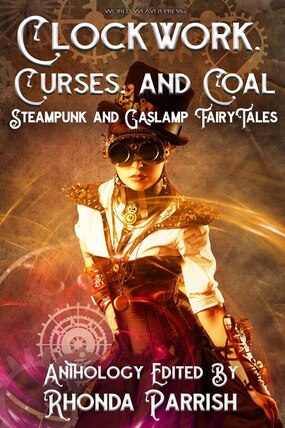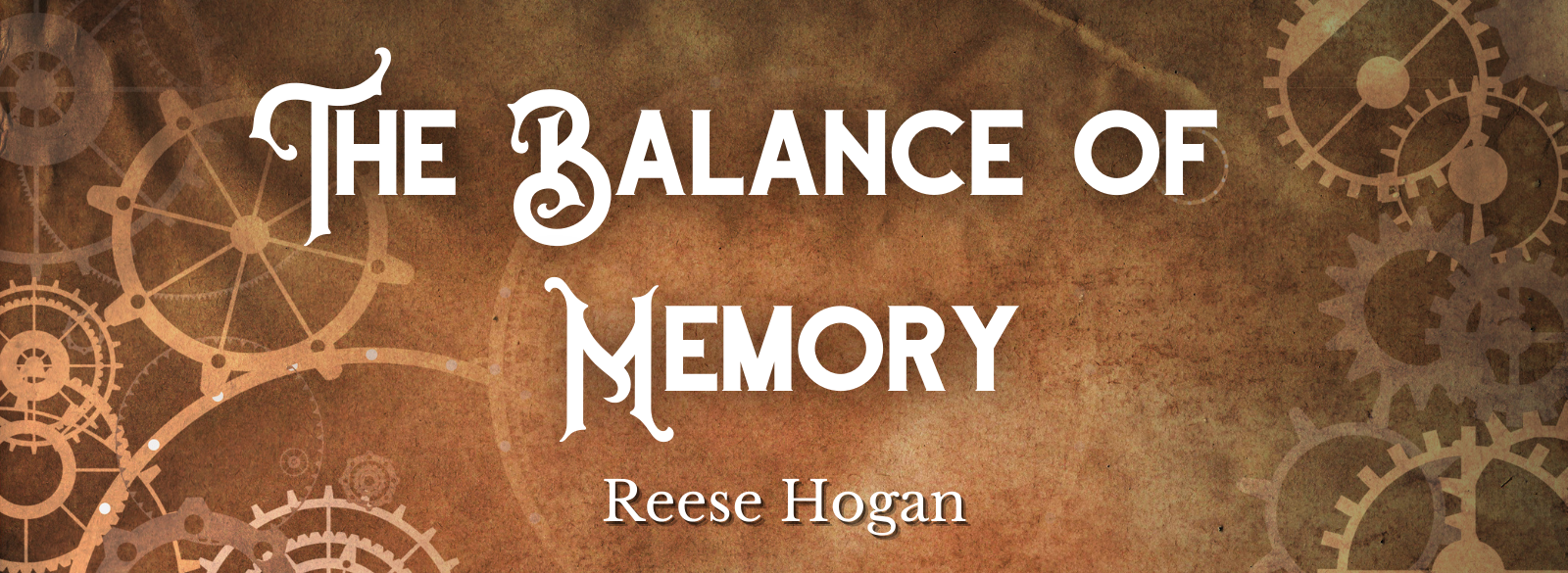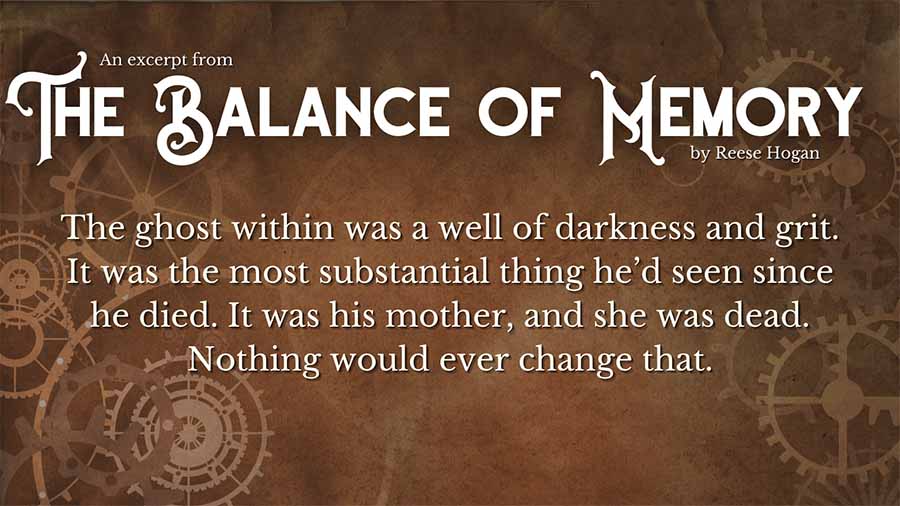 Guest Blog by Reese Hogan There’s one line from “The Balance of Memory” that sums up the seeds of its origins perfectly: “You can’t take me away from myself.” Though the story itself is one of a split personality and survival and looking for acceptance in toxic places, the roots of the theme were borne from a moment of severe anxiety that resulted in an experience I’d never had before and haven’t had since. Anxiety, at its heart, is incessant worry, though that doesn’t fully capture how debilitating it can be. I would more accurately call it “paranoia”. To someone who doesn’t know what severe anxiety is like, the best explanation I’ve come up with is, “Think of the worst-case scenario in any given situation. Anxiety is your mind convincing you that this outcome is not only likely, but practically inevitable.” This kind of anxiety tells you that you can and will lose everyone close to you, whether it happens in the near future or several years from now. And this kind of anxiety will hand you coping mechanisms, often in the form of “backup plans” for how to handle your life after these worst-case scenarios come to pass. What if I lose all my friends? What if I lose my career? What if my spouse leaves me, or my family stops talking to me, or my children pass away? What would I do if any of that happened? Or—perhaps more significantly—what would I do if all of that happened? These were the thoughts I found myself battling on a winter day in Colorado, after suffering a several week bout of severe anxiety that had left me convinced I needed a plan in case everything I loved was taken away. Serendipitously, I was listening to an Anberlin album, and a song called “Losing It All” came on as I mentally stripped, one thing after another, each thing I loved from my life to see what I’d be left with at the end. If everything was taken from me—my books, my music, my home, my family—what would I have to live for? There was only one thing, I realized, that could never be taken away from me: myself. At the end, there would be only one companion I could count on to always be there, only one person to turn to if everyone else was gone. It was in that moment that I realized how crucial it was to try to carve the self-hate out of my life. If you are stuck with one, and only one, person for the rest of your life, you do not want that person to be an abuser; you need them to be someone who loves and protects you, and will get you through whatever life throws at you. On my radio, Stephen Christian sang, “It’s not losing it all if we have each other. In the end, it’s all that matters.” This song to me, ever since, has been a credo on self-love and self-acceptance. When I wrote “The Balance of Memory”, my retelling of Hansel and Gretel, I wanted badly to try to recapture this feeling I’d had, of a personality splitting in order to protect oneself. In the process of studying Hansel and Gretel, I was struck by the fact that a pair of children who could be turned out of their house by their own parents would most likely have suffered other forms of abuse and/or neglect prior to this abandonment. So this is what I decided to explore in my story: a single child, subjected to experimentation in their father’s steampunk laboratory, who splits into two beings as a form of self-defense against having no one else to turn to. From there, the story filled out to address the complications this might introduce. How many thoughts would the two beings share, and how many would be separate? What about their memories? What kinds of ghosts existed in their lives, both metaphorically and literally, and how did these ghosts affect them differently? Would they still view themselves as living beings, as dead ones, or as something else entirely? The result of these musings was a girl with a steel jaw and a clever mind, a boy with goggles for eyes and a dark heart, a mutual hunger for the ghosts under their roof, and the careful balance of their souls around the secret that once made them whole. From a stranger’s hunt for immortality to the confines of a graveyard, “The Balance of Memory” is a deep dive into the coping methods of the mind…but it is also the journey of a fractured soul rebuilding, one cog and gear at a time. Reese Hogan is a nonbinary science fiction author from New Mexico. They have published three novels, and the latest, Shrouded Loyalties from Angry Robot, was a Best SFF of August 2019 pick by both Amazon and Barnes & Noble. When Reese first began a retelling of Hansel & Gretel, they were struck by the traumatic childhood the siblings must have faced even before they were abandoned in the woods. This led to an exploration of coping mechanisms, repression, and the need for companionship, and a few weeks later, “The Balance of Memory” was born. It is Reese’s first traditionally published short story. Read more at www.reesehogan.com or follow them on Twitter @ReeseHogan1.
0 Comments
Your comment will be posted after it is approved.
Leave a Reply. |
World Weaver PressPublishing fantasy, paranormal, and science fiction. Archives
February 2024
|
- Home
-
Books
-
All Books
>
- Beyond the Glass Slipper
- Bite Somebody
- Bite Somebody Else
- Black Pearl Dreaming
- Cassandra Complex
- Causality Loop
- Clockwork, Curses, and Coal
- Continuum
- Corvidae
- Cursed: Wickedly Fun Stories
- Dream Eater
- Equus
- Fae
- Falling of the Moon
- Far Orbit
- Far Orbit Apogee
- Fractured Days
- Frozen Fairy Tales
- Glass and Gardens: Solarpunk Summers
- Glass and Gardens: Solarpunk Winters
- Grandmother Paradox
- Grimm, Grit, and Gasoline
- Haunted Housewives
- Heir to the Lamp
- He Sees You When He's Creepin': Tales of Krampus
- Into the Moonless Night
- Jack Jetstark's Intergalactic Freakshow
- King of Ash and Bones (ebook)
- Krampusnacht
- Last Dream of Her Mortal Soul
- Meddlers of Moonshine
- Mothers of Enchantment
- Mrs Claus
- Multispecies Cities
- Murder in the Generative Kitchen
- Recognize Fascism
- Scarecrow
- Sirens
- Shards of History
- Shattered Fates
- Skull and Pestle
- Solarpunk (Translation)
- Solarpunk Creatures
- Solomon's Bell
- SonofaWitch!
- Speculative Story Bites
- Trenchcoats, Towers, and Trolls
- Weredog Whisperer
- Wolves and Witches
- Anthologies and Collections
- Novels
- Novellas
- Fairy Tale
- Fantasy
- Romance
- Science Fiction
- Urban/Contemporary Fantasy
- Young Adult SFF
-
All Books
>
- Blog
- About
- Contact
- Press / Publicity
- Newsletter Signup
- Privacy Policy
- Store



 RSS Feed
RSS Feed